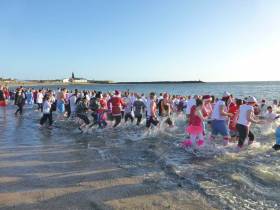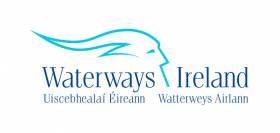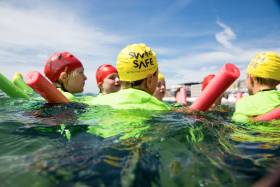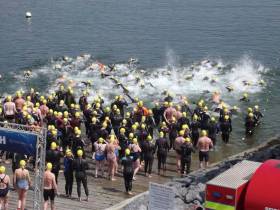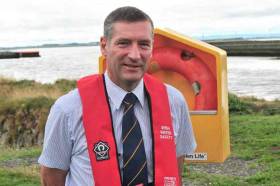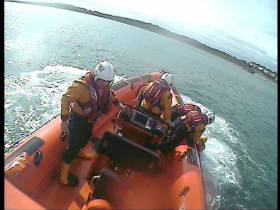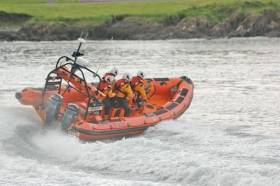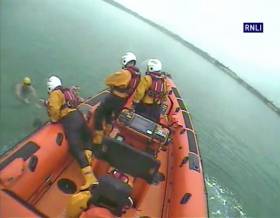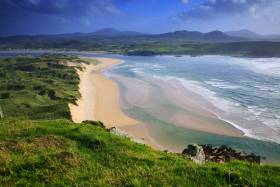Displaying items by tag: swimming
County Down Swimmer Breaks Ice Swimming World Record
A County Down swimmer has broken a world record and claimed two gold medals at the ice swimming world championships, reports The Belfast Telegraph.
Grace McLaughlin from Bangor defied freezing temperatures to triumph at the International Ice Swimming Association’s (IISA) fifth world championship held in Samoens, a ski resort and summer holiday destination in the Haute-Savoie department in the Auvergne-Rhône-Alpes region in south-eastern France. It was held over four days from 12th till 15th January.
Ice Swimming is swimming in water temperature of 5.0C / 41.0F unassisted, with a silicon cap, pair of goggles and standard swimming costume. Grace swam in temperatures below 4C in two individual races — a 1k event on the first day and another 500m stretch the next day. The final day was a relay team event.
In these individual icy plunges, she won two gold medals in the 50-54 age category, one in the 1k and another in the 500m in which she also broke the world record in seven minutes and 38 seconds. Speaking tonight, Grace was delighted at her achievements;” I was well pleased — shocked and pleased. I am just delighted that I was even able to get that. I didn’t expect that I would go as fast as I did, because we are swimming at altitude here. We are also swimming in very cold temperatures, so your performance will be much slower than what you would be at warmer temperatures”.
 County Down swimmer Grace McLaughlin courtesy Belfast Telegraph
County Down swimmer Grace McLaughlin courtesy Belfast Telegraph
Grace has many years experience as a swimmer, having been a member and coach in Bangor Swimming Club for 19 years and also very much involved in getting open water swimming started in the North Down area. The first venture was in Groomsport 17 years ago, which became so popular they moved to Ballyholme Yacht Club near Bangor and began swimming sessions on a Monday night during the summer.
Having already completed two North Channel crossings, the first in June 2021 when four open-water swimmers became the first all-female relay team to swim the treacherous the Dál Riata Channel, the stretch of the North Channel between the Mull of Kintyre and the County Antrim coastline. In fact, due to the strong tides the actual distance covered was 21.9 miles to Ballycastle on the Causeway Coast. In 2022 Grace was part of another relay to swim from Donaghadee on the North Down coast to Portpatrick on the Mull of Kintyre.
Her next challenge is to do this year a solo crossing of the North Channel sometime between July 23rd and 30th.
More on The Belfast Telegraph story here
RNLI Urges Christmas Swimmers To Stay Safe Before They Dive In
#WaterSafety - For many in Ireland a festive dip in the sea is part of a Christmas tradition.
But the RNLI reminds anyone planning for a seaside swim next week that the sea is at its coldest, and potentially most deadly.
If you run straight into cold water, you are more likely to suffer from cold water shock. The best way to avoid this is to wear a wetsuit.
If this isn’t possible, walk into the sea slowly and stay shallow. This will allow your body time to acclimatise gradually.
Cold water shock is a physiological response which causes uncontrollable gasping. This increases the risk of you swallowing water and puts a strain on your heart — in extreme cases it can cause cardiac arrest.
If you feel you this happening to you, fight your instinct to thrash around and swim hard, instead just lie back and float.
The initial shock will pass within 60–90 seconds, and when you have regained control of your breathing, you can then try swimming to safety or calling for help.
This skill will give you a far better chance of staying alive.
If you see someone else in trouble in the water, fight the instinct to go in yourself. Call 999 or 112 and ask for the coastguard.
The RNLI’s drowning prevention campaign, Respect the Water, aims to raise awareness of key hazards like cold water shock, and lifesaving skills like floating.
Find out more about how to float and about cold water shock by visiting RespectTheWater.com.
#WaterSafety - Waterways Ireland has warned over the dangers of swimming and diving in and around navigation infrastructure such as bridges, locks, weirs, pontoons and harbour jetties.
The possibility of a swimmer being struck by a vessel, its propeller or being run over is ever present while powered craft are manoeuvring at such locations.
Swimming is therefore prohibited at these locations.
Waterways Ireland also advises all participants engaged in open water swimming training of the inherent dangers attached to this activity in locations where there is boating traffic.
A swimmer in the water wearing high visibility head gear will always remain a very small target to see to the master of a powered craft particularly if:
- the water surface is choppy
- there is strong glare reflected from the water surface
- there is difficulty in sighting due to slanting sunshine in early morning or late evening
- visibility is poor due to fog, mist or rain
Swimmers should risk assess their swimming location prior to entering the water, for boat traffic, entry and exit locations, availability of life saving appliances, weather and water conditions.
The presence of a safety boat or kayak will always give enhanced safety and security.
Earlier this week, two men lost their lives in separate incidents while swimming in Lough Derg on the Shannon Navigation, as previously reported on Afloat.ie.
#Swimming - Northern Ireland will be included for the first time in Swim Safe, a programme offering free outdoor swimming and water safety sessions for children aged 7-14 across the UK.
Swim Safe teaches children how to stay safe when swimming outdoors, which is often more challenging than swimming in a pool.
The programme was created by the RNLI and Swim England, the national governing body for swimming in England.
The free, hour-long Swim Safe sessions are run by qualified swimming teachers and lifeguards, supported by a team of trained volunteers, covering both land-based safety and practical tuition in the water.
Wetsuits, swimming hats and a free goody bag with a t-shirt are all provided. Children must be able to swim at least 25 metres to take part.
Since Swim Safe started in 2013 with just one site in Bude, Cornwall, over 18,000 sessions have taken place across the country – last year over 7,000 children took part in England and Wales.
Now in its fifth year, the programme continues to grow and in 2017, Swim Safe sessions will take place at 20 sites across the UK and Ireland including beaches, lakes, reservoirs and other inland locations.
“Children love swimming outdoors, but swimming in the sea, rivers and lakes is more challenging than swimming in a pool, where most lessons take place,” said Guy Botterill, Swim Safe project manager for the RNLI. “Thanks to Swim Safe, thousands of children will learn how to keep safe when swimming outdoors and know what to do if they get into trouble.”
To book a free Swim Session at Groomsport, near Bangor on Belfast Lough, visit Swimsafe.org.uk — and find out more about the programme via #SwimSafe hashtag and at Facebook.com/SwimSafeOutdoors
Open Water Swim For Dunmore East Lifeboat This Month
#Swimming - This year’s Dunmore East RNLI Open Water Swim sponsored by Activate and Lidl will take place on Saturday 20 May.
Entry is €25 for any of three swims over distances of 1600m, 800m and a junior swim of 500m, starting at 12.30pm from the slip behind Waterford Harbour Sailing Club in Dunmore East.
“We had such a successful event last we are really looking forward to this year’s event,” said Dunmore East RNLI lifeboat crew member Neville Murphy.
“We live in one of the most beautiful parts of the country with a stunning coastline, and it is the perfect location for this type of event.
“Let’s hope the weather is as good as last year and we have as many participants, which in turn will help us raise funds for the RNLI and their lifesaving work.”
This year’s event promised a fun-filled family atmosphere with balloon making, face painting and much more children’s entertainment, and a BBQ for swimmers and their supporters alike.
All prizegiving will take place at the newly refurbished Waterford Harbour Sailing Club after the completion of all three swims, with music entertainment will be provided by DJ Frankie McAvoy.
For more information about the Dunmore East RNLI Open Water Swim and to register online, go to www.athleticstiming.com.
Irish Water Safety Survey: Getting The Public To Understand The Importance of 'Swimming as a Life Skill'
The Chief Executive of the State agency responsible for promoting water safety has been telling me about an interesting piece of research which his organisation carried out over the past two months.
The purpose of this research on water safety was, he said, to help the organisation “learn more about the public’s understanding and knowledge of the importance of water safety and to gain an indication of swimming ability at large amongst the public and attitudes towards and involvement in watersports.
John Leech is a former Lt.Cdr. with the Naval Service and was one of the leaders in the development of the Navy’s Diving Unit. He is also an experienced sailor and Race Officer for yachting events, so he has a lot of experience and a vast knowledge of the importance of safety on the water.
On the new edition of my radio programme, THIS ISLAND NATION, he details the results of the survey which showed that the majority of respondents appreciated the “necessity of swimming as a life skill.”
Swimming stands out as the watersport activity in which most adults participate, the survey found.
As CEO of Irish Water Safety, John can take satisfaction in the public recognition of IWS as the primary body engaged in developing knowledge of water safety in Ireland, but he does strike an important note about teaching children swimming. There is a lack of awareness of this, it seems, in the national schools, to judge from the survey findings.
Listen to John Leech below on THIS ISLAND NATION podcast for the full details of the research findings.
#RNLI - Skerries RNLI rescued a swimmer in difficulty yesterday afternoon (Tuesday 11 April) after he encountered a strong tide near Shenick Island and was unable to make his way ashore.
Dublin Coast Guard tasked Skerries RNLI shortly before noon after receiving an emergency call from a member of the public who had spotted a swimmer struggling to make any progress against the tide at the island off Skerries.
Volunteers launched the Atlantic 85 inshore lifeboat Louis Simson, with David Knight at the helm and crew Philip Ferguson, Joe May and Laura Boylan.
The lifeboat proceeded to the area indicated by the caller, where an Irish Coast Guard helicopter had also arrived on scene. They took the male casualty on board the lifeboat, protected him from the elements, and began first aid assessments as they made their way back to the station.
The casualty had swallowed seawater during his efforts to swim to shore and as a result, on the advice of the crew, he was transferred by ambulance to hospital for further assessment.
Speaking after the callout, Skerries RNLI lifeboat press office Gerry Canning said: “We’ve had a couple of tidal-related incidents in the last few days. We’d just like to remind people that the strength and height of the tide varies throughout the month.
“We would strongly recommend checking tide tables before engaging in any activity on or near the sea.”
Bangor Lifeboat Saves Swimmer In Ballyholme Bay
#RNLI - At 8.10am this morning (Wednesday 28 December), Bangor RNLI’s volunteer crew responded to a request from HM Coastguard to rescue a young man reported to be in difficulty while swimming 200 metres off the shore in Ballyholme Bay.
The alarm was raised by Ards and North Down council employee Mark Pollock as he was working in Banks Car Park. Hearing faint shouts, he initially thought it was someone calling for their dog, but persevered looking in the sea until he became aware that there was someone in the water.
Bangor RNLI’s volunteer crew responded within minutes and made their way to Ballyholme Bay.
Helmsman James Gillespie said later: “On arrival, the early morning light made it difficult to see, but fortunately the water was flat calm, and on scanning the area I saw a slight movement as the casualty raised his hand.”
Heading quickly to the scene, crew member Johnny Gedge entered the water to support the casualty, who was only just conscious, until he could be lifted on board the lifeboat, where crew members Joanne Heasley and Jack Irwin put their casualty care training to good use.
Gillespie added: “Our extensive training in casualty care is invaluable at a time like this. Because of this, we know the importance of not trying to warm the patient too quickly as this can cause cardiac arrest.
“Instead, we made the patient safe, and prevented further cooling, and returned as quickly and safely as we could to the lifeboat station where an ambulance and paramedics were waiting to take over.”
The patient, who is thought to be in his late 20s, was wearing only tracksuit bottoms, a T-shirt and socks, and it is unknown why he was in the water.
A shocked Pollock said: “I am just delighted that I heard his calls, and hope he makes a full recovery.”
Speaking after the ambulance left to take the patient to hospital, Bangor’s lifeboat operations manager Kevin Byers said: “I understand from talking to medical personnel at the scene, that only five minutes more in the water would have been fatal, and that the crew took exactly the right actions to give this young man the best chance of a full recovery.
“I am always proud of my team, but their response this morning was magnificent. Not just the four crew members on the boat, but the many others who responded to their pagers and were prepared to do whatever they could to help.”
Skerries Lifeboat Rescues Swimmer Near Colt Island
#RNLI - Skerries RNLI responded yesterday afternoon (31 October) to reports of swimmers in difficulty to the south of Colt Island off the north Co Dublin town.
Shortly after 12 noon, a member of the local fishing fleet alerted Dublin Coast Guard that several swimmers appeared to be having difficulty returning to shore.
Skerries RNLI volunteers launched the lifeboat, with Peter Kennedy at the helm and crewed by Gerry Canning and Steven Johnston, all of whom were already in the station attending a casualty care course when the pager sounded.
Arriving on scene, the crew quickly located a male and a female swimmer, with a fishing vessel standing by them.
The male swimmer had been dragged further out to sea than intended and, with the effects of the cold water starting to set in, was struggling to swim against a strong current.
The female swimmer was in no difficulty and had gone to assist him. She was also able to tell the crew that two other swimmers who had been in the area had made it ashore themselves.
Both swimmers were taken on board the lifeboat, and the woman was dropped ashore to retrieve her belongings. However, the man was very cold and the crew decided he should be brought back to the station for further assessment.
He was brought into the warmth of the station by members of crew on the shore who began to treat him for mild hypothermia. As a precaution, he was then checked over by Skerries RNLI’s honorary medical officer, Dr Seamus Mulholland.
After a short time, the man was well enough to be on his way and the Skerries lifeboat volunteers returned to their casualty care training.
Speaking after the callout, Skerries RNLI lifeboat press officer Gerry Canning said: “The speed of response is crucial in cases like this as the effects of cold water can cause a casualty’s condition to worsen quite quickly.
“You won’t get a much quicker launch than when there is already a full crew in the station training when the pagers sound.”
Body Found In Search For Missing Holidaymaker Off Inishowen
#IsleOfDoagh - A body has been found this afternoon (Thursday 1 September) in the search for a man missing from the Isle of Doagh since Monday evening.
As previously reported on Afloat.ie, the man was reported missing by his family after going swimming during a camping holiday on the Inishowen Peninsula.
But according to The Irish Times, a body was recovered at Five Fingers Strand across from Doagh in the search for 59-year-old Tony Griffiths.



























